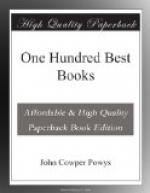39. ROMAIN ROLLAND. JEAN CHRISTOPHE. Translated by Gilbert Cannan.
Rolland’s “Christophe” is without doubt the most remarkable book that has appeared in Europe since Nietzsche’s “Ecce Homo.”
It is a profoundly suggestive treatise upon the relations between art and life. It contains a deep and heroic philosophy—the philosophy of the worship of the mysterious life-force as God; and of the reaching out beyond the turmoil of good and evil towards some vast and dimly articulated reconciliation. Since “Wilhelm Meister” no book has been written more valuable as an intellectual ladder to the higher levels of aesthetic thought and feeling.
Massive and dramatic, powerful and suggestive, it magnetizes us into an acceptance of its daring and optimistic hopes for the world; of its noble suggestions of a spiritual synthesis of the opposing race-traditions of Europe. Of all the books mentioned in this list it is the one which the compiler would most strongly recommend to the notice of those anxious to win a firmer intellectual standing-ground.
40. GABRIELE D’ANNUNZIO. THE FLAME OF LIFE. THE TRIUMPH OF DEATH. Translated by Arthur Hornblow.
D’Annunzio is the most truly Italian, the most inveterately Latin, of all recent writers. Without light and shade, without “nuance,” without humor or irony, he compels our attention by the clear-cut, monumental images he projects, by the purple and scarlet splendor of his imperial dreams.
His philosophy, though lacking in the deep and tragic imagination of Nietzsche, has something of the Nietzschean intellectual fury. He teaches a shameless and antinomian hedonism, narrower, less humane, but more fervid and emotional, than that taught by Remy de Gourmont.
In “The Triumph of Death” we find a fierce smoldering voluptuousness, expressed with a hard and brutal realism which recalls the frescoes on the walls of ancient Pompeii. In “The Flame of Life” we have in superb rhetoric the most colored and ardent description of Venice to be found in all literature. Perhaps the finest passage he ever wrote is that account of the speech of the Master of Life in the Doge’s Palace with its incomparable eulogy upon Veronese and its allusion to Pisanello’s head of Sigismondo Malatesta.
42. DOSTOIEVSKY. CRIME AND PUNISHMENT. THE IDIOT. THE BROTHERS KARAMAZOV. THE INSULTED AND INJURED. THE POSSESSED. Translated by Constance Garnett and published by Macmillan. Other translations in Everyman’s Library.
Dostoievsky is the greatest and most racial of all Russian writers. He is the subtlest psychologist in fiction. As an artist he has a dark and sombre intensity and an imaginative vehemence only surpassed by Shakespeare. As a philosopher he anticipates Nietzsche in the direction of his insight, though in his conclusions he is diametrically opposite. He teaches that out of weakness, abnormality, perversity, foolishness, desperation, abandonment, and a morbid pleasure in humiliation, it is possible to arrive at high and unutterable levels of spiritual ecstasy. His ideal is sanctity—not morality—and his revelations of the impassioned and insane motives of human nature—its instinct towards self-destruction for instance—will never be surpassed for their terrible and convincing truth.




